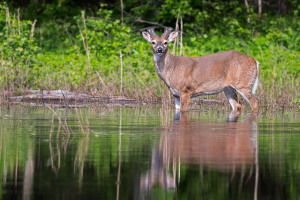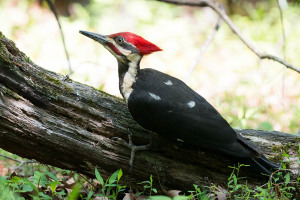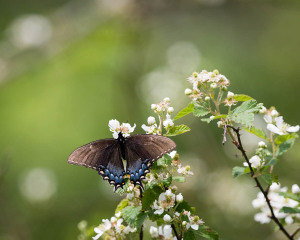It’s Springtime and we’ve just returned from our vacation in the Smoky Mountains. For the past several years we’ve rented a log cabin in Townsend, TN near the entrance to the park.
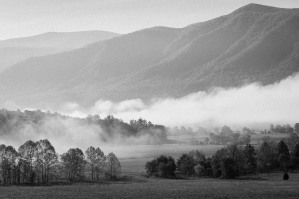 Cades Cove is entirely surrounded by mountains and lies at an elevation of approximately 2,000 feet. It’s the most popular and visited area in the National Park due to its natural scenery, historic structures and bountiful wildlife. An early morning visit will often reveal clouds gently nestled along the valley.
Cades Cove is entirely surrounded by mountains and lies at an elevation of approximately 2,000 feet. It’s the most popular and visited area in the National Park due to its natural scenery, historic structures and bountiful wildlife. An early morning visit will often reveal clouds gently nestled along the valley.
Like a trip back in time…
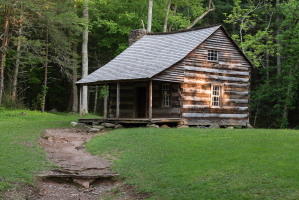 Several old homesteads, barns and other buildings dating from the 1800’s and early 1900’s have been preserved for all to visit. It gives you somewhat of a feeling of how life in the Cove must have been back then. When the National Park Service took over the area in the 1930’s there were several residents who did not want to leave. One look at the area’s beauty and you can understand why. Shown here is the Carter Shields Cabin.
Several old homesteads, barns and other buildings dating from the 1800’s and early 1900’s have been preserved for all to visit. It gives you somewhat of a feeling of how life in the Cove must have been back then. When the National Park Service took over the area in the 1930’s there were several residents who did not want to leave. One look at the area’s beauty and you can understand why. Shown here is the Carter Shields Cabin.
Then there’s the wildlife…
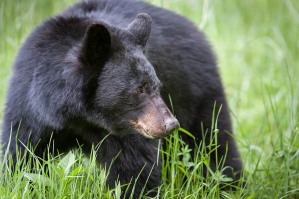 Pretty much everyone who visits the park hopes to catch a glimpse of a bear. Most are not disappointed. The park itself boasts having around 1,800 Black Bears. It’s not uncommon to see several in the late afternoon along the 11 mile loop. You can usually expect to encounter a “bear jam” when people stop their cars, halt traffic and try to take pictures with their camera phones.
Pretty much everyone who visits the park hopes to catch a glimpse of a bear. Most are not disappointed. The park itself boasts having around 1,800 Black Bears. It’s not uncommon to see several in the late afternoon along the 11 mile loop. You can usually expect to encounter a “bear jam” when people stop their cars, halt traffic and try to take pictures with their camera phones.
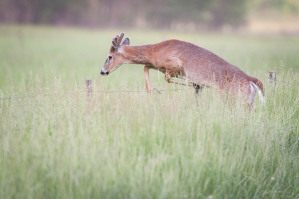 While driving along, you can’t help but notice old fences surrounding the fields. You might even think that the fences are there to keep the animals pinned in. You’d be wrong. Actually, the purpose is more to keep the people out. The smooth wire is certainly no barrier to the animals and does them no harm.
While driving along, you can’t help but notice old fences surrounding the fields. You might even think that the fences are there to keep the animals pinned in. You’d be wrong. Actually, the purpose is more to keep the people out. The smooth wire is certainly no barrier to the animals and does them no harm.
There’s usually plenty to eat for all the wildlife. And there’s plenty to drink as well. Just a short hike off the loop road are several small streams and ponds. Here a relatively large buck decides to cool off and get a sip of water. He hears my camera shutter click and looks over in my direction. After a brief look he took another drink and slowly walked away.
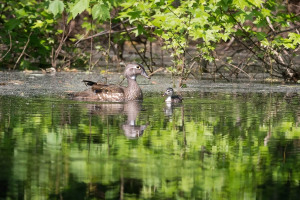
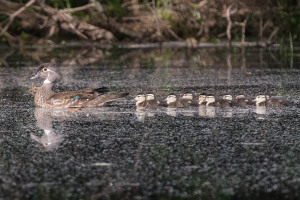 Shortly after the buck makes his exit a mother Wood Duck guardedly paddles out with her chicks. For 3 days we followed the family and observed the care she took to ensure their survival. The first day we counted 11 chicks. Unfortunately, that number had dropped to 10 by our second visit.
Shortly after the buck makes his exit a mother Wood Duck guardedly paddles out with her chicks. For 3 days we followed the family and observed the care she took to ensure their survival. The first day we counted 11 chicks. Unfortunately, that number had dropped to 10 by our second visit.
Here you can see the proud mother and her 10 chicks in tow.
Not all the birds live in the water. Pileated Woodpeckers can be seen and heard throughout the valley. They are the largest woodpecker found in North America. Only the very similar Ivory-billed Woodpecker is larger but, they’re most likely extinct. This male Pileated has found some yummy bugs in an old log.
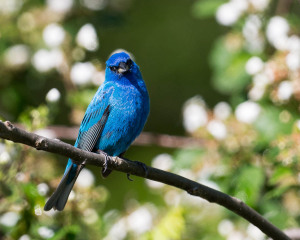 In the Spring, the fields and trees are full of resident and migrating songbirds. One of my favorites is the Indigo Bunting. These little guys are bursting with color and song. You can hear them singing in the trees and bushes near just about every stream in the valley.
In the Spring, the fields and trees are full of resident and migrating songbirds. One of my favorites is the Indigo Bunting. These little guys are bursting with color and song. You can hear them singing in the trees and bushes near just about every stream in the valley.
The season also brings thousands of butterflies. They’re everywhere on the ground and in the fields. This Black Swallowtail is making a brief pit-stop on a flowering blackberry bush before moving on.
So much natural beauty…
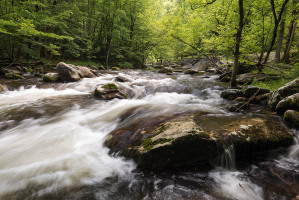 Spring showers fill the mountain rivers and streams. This creates some of the most beautiful cascades and small waterfalls you will see anywhere. It’s easy to sit for hours listening to the rush of water and watching the white foam pound over huge boulders while washing away your cares.
Spring showers fill the mountain rivers and streams. This creates some of the most beautiful cascades and small waterfalls you will see anywhere. It’s easy to sit for hours listening to the rush of water and watching the white foam pound over huge boulders while washing away your cares.
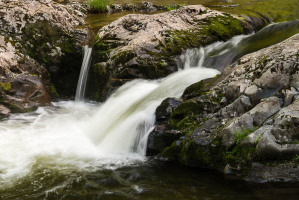 This is just a small sampling of the cascades along Little River near the Tremont Institute. Sometimes I find that focusing in on the details of a small section of falls can be even more interesting.
This is just a small sampling of the cascades along Little River near the Tremont Institute. Sometimes I find that focusing in on the details of a small section of falls can be even more interesting.
For a nature lover and photographer, Cades Cove never disappoints. It’s a special place. Like a magnet it keeps drawing me back and I can hardly wait for my next journey there.

